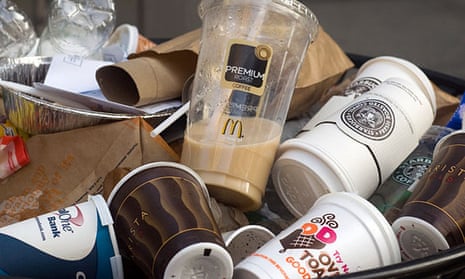A £1m fund to help expand and improve paper cup recycling facilities across the UK will be launched on Thursday by the coffee giant Starbucks and environmental charity Hubbub.
Local authorities, recycling companies and social enterprises will be invited to bid for grants of up to £100,000 on behalf of their communities to create at least 10 large-scale recycling programmes.
The so-called Cup Fund is financed by the 5p paper cup charge or “latte levy” introduced by Starbucks last year in an effort to reduce the overuse and waste of an estimated 2.5bn disposable cups every year.
Although there are now enough specialist recycling facilities in the UK to recycle all the paper cups used, there remains the challenge of collecting the cups and getting them there. The tricky issue has been the plastic film on the inside of paper cups that means they can rarely be recycled with other mixed recycling. As a result, one in 400 cups is recycled and the rest end up in landfill.
The new scheme aims to increase the number of drop-off points needed to collect the cups separately and provide clearer communication to help consumers recycle effectively.
“We know that local authorities and building managers are committed to achieving their recycling targets but with increased strain on their budgets, investing in infrastructure is difficult,” said Trewin Restorick, chief executive of Hubbub. “The launch of the Cup Fund means we will be able to collect cups in significant volumes in areas where there may not have been any drop-off points before. We’re looking for ambitious, large-scale projects that will transform cup recycling in high-footfall areas.”
The winning bids will be chosen by an independent panel of experts, including the Local Authority Recycling Advisory Committee and the Chartered Institution of Wastes Management.
